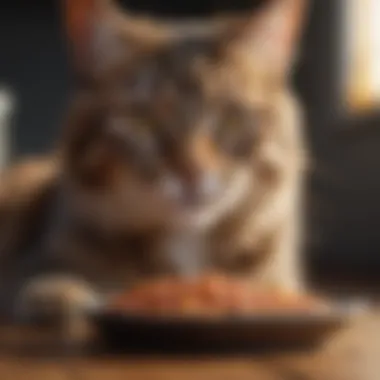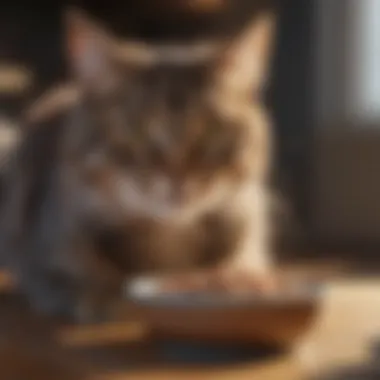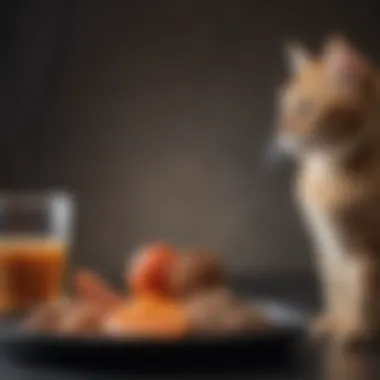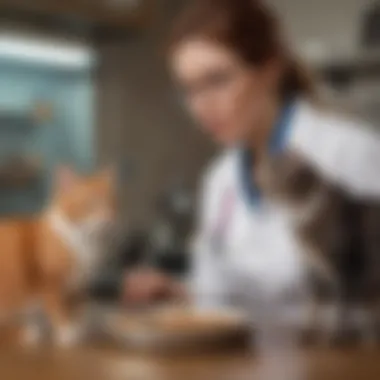Understanding kd Renal Cat Food: A Comprehensive Guide


Intro
Kidney health in cats is a complex and critical topic. Understanding the specific dietary needs of felines with renal issues is vital for their well-being. kd renal cat food is formulated to meet these needs thoroughly. This guide provides an in-depth look at this specialized diet, covering the formulation, nutritional benefits, and effective feeding practices. It also offers insights on how to best manage your cat's renal health through diet and lifestyle choices.
Animal Profile
General Overview
Cats are unique creatures, with specific dietary requirements that can change based on health conditions. Renal issues in cats, common among older pets, require special attention. kd renal cat food is tailored for these animals, providing essential nutrients while being gentle on their kidneys.
Habitat and Distribution
Unlike wild animals, domestic cats inhabit homes, where they coexist with humans. Their dietary needs can vary based on factors like breed, age, and existing health conditions. It's important for pet owners to understand the variations in diet that their cats may require due to health challenges.
Nutritional Aspects of kd Renal Cat Food
The formulation of kd renal cat food is crucial in promoting renal health. This food is low in phosphorus and protein, which helps reduce the workload on the kidneys.
- Key Ingredients: Prescription formulas often include high-quality proteins that are easier to digest. They also contain essential fatty acids, vitamins, and minerals to support overall health.
- Hydration: kd food sometimes comes in wet forms. This can boost water intake, benefiting kidney function.
Feeding Strategies
Establishing an effective feeding strategy for your cat on kd renal diet is important. Here are some considerations:
- Regular Feeding Schedule: Set specific times for meals. Structure helps maintain a routine.
- Amount Control: Follow the vet's recommendations for portion sizes. Monitor your cat’s weight regularly.
- Gradual Transition: If switching to kd food, do so gradually to avoid digestive upset.
Health Benefits
There are many advantages to using kd renal cat food:
- Kidney Function Support: Low protein and phosphorus help maintain kidney function.
- Weight Maintenance: Formulation assists in keeping a healthy weight, reducing stress on the kidneys.
- Palatability: Many cats find kd food tasty, encouraging food intake despite their health conditions.
“Using the right diet is a vital aspect of managing feline kidney disease effectively. Proper nutritional support leads to a better quality of life.”
Potential Alternatives
In some situations, pet owners might consider alternatives or supplements alongside kd renal cat food. Options include:
- Homemade Diets: Only if approved by a veterinarian, can homemade meals supply needed nutrients at lower phosphorus levels.
- Other Prescription Foods: Brands like Hill's Prescription Diet or Royal Canin also offer renal support options that can be discussed with a veterinarian.
End
Understanding kd renal cat food is essential for ensuring optimal health in cats with kidneys issues. This guide offers a fundamental overview, but consulting a veterinarian for personalized advice is always necessary. With the right diet and attention, managing feline kidney health can lead to an improved quality of life.
Preface to kd Renal Cat Food
Introducing kd Renal Cat Food addresses a critical aspect of feline health, particularly for cats with kidney issues. Kidney disease in cats presents a serious concern, and the right nutrition can impact a cat's health, longevity, and quality of life. kd Renal Cat Food is formulated specifically to support cats needing specialized dietary care due to these challenges.
Understanding what kd Renal Cat Food is and its significance in a cat's diet is crucial for pet owners. It allows for informed decisions about dietary changes that can directly affect kidney function. This section will explore key facts and considerations regarding kd Renal Cat Food, highlighting its importance in managing kidney disease effectively.
What is kd Renal Cat Food?
kd Renal Cat Food is a premium pet food developed to meet the needs of cats facing kidney disease. The product line is designed by veterinarians and pet nutritionists to provide a balance of nutrients while minimizing certain ingredients that could exacerbate kidney stress. Typically, this food is lower in protein and phosphorus, which helps reduce the workload on a cat's kidneys.
The formulation often includes omega-3 fatty acids, antioxidants, and essential vitamins to provide overall health support. These components help mitigate symptoms associated with kidney disease while also aiding in preserving muscle mass and overall body condition. By providing a specialized diet, kd Renal Cat Food aims to not just sustain life but improve it by addressing specific health concerns.
Importance of Specialized Nutrition
Specialized nutrition plays a vital role in the management of kidney health in cats. Cats suffering from renal disease often require diets that differ markedly from standard cat food. Nutritional adjustments can help control the progression of kidney disease, alleviate symptoms, and improve the quality of life.
- Reduced Protein: Lower levels of protein lessen the burden on the kidneys, which are responsible for filtering waste from protein metabolism.
- Lower Phosphorus Levels: High phosphorus can lead to secondary complications, including bone disease. Foods with restricted phosphorus can help mitigate these risks.
- Enhanced Hydration: Many renal foods come in wet form, increasing moisture intake and supporting urinary health which is crucial for kidney function.


Specialized nutrition is not merely about sustenance; it’s about tailoring dietary elements to enhance health and well-being in vulnerable populations like cats with renal issues.
In summary, kd Renal Cat Food represents not just a dietary option but a committed choice toward promoting renal health. Recognizing the importance of tailored nutrition ensures responsible pet ownership while contributing positively to a cat's health journey.
Understanding Kidney Disease in Cats
Understanding kidney disease in cats is crucial in the context of kd Renal Cat Food. Chronic kidney disease (CKD) is one of the most common issues in older felines. The kidneys play a vital role in filtering waste from the blood and maintaining fluid balance. Any compromise in these functions can lead to serious health implications. Identifying and managing kidney disease becomes paramount for pet owners to enhance their cat's quality of life.
Common Types of Kidney Disease
There are several types of kidney disease that can affect cats, primarily categorized into chronic and acute forms.
- Chronic Kidney Disease (CKD): This is progressive. It usually occurs in older cats and develops over time. It often goes unnoticed until significant damage has occurred.
- Acute Kidney Injury (AKI): This can occur suddenly, often due to toxins, medications, or infections. It demands immediate veterinary attention.
- Polycystic Kidney Disease (PKD): This is a genetic disorder common in some breeds, leading to fluid-filled cysts in the kidneys.
Each of these conditions requires a different management approach, highlighting the need for tailored nutrition and care strategies.
Symptoms of Kidney Disease
Recognizing the symptoms of kidney disease is essential for timely intervention. Common signs include:
- Increased thirst and urination
- Decreased appetite
- Weight loss
- Vomiting
- Lethargy
- Bad breath (which can have a urine-like odor)
When these symptoms appear, they may indicate significant renal deterioration. Early detection can facilitate better management and improve the cat's prognosis.
Diagnosing Kidney Issues in Cats
Diagnosing kidney disease involves several veterinary procedures. Initially, a complete physical examination is done to assess the cat’s overall health. Following this, diagnostic tests are crucial:
- Blood Tests: These can evaluate kidney function by measuring blood urea nitrogen (BUN) and creatinine levels.
- Urinalysis: This tests the concentration and composition of urine, helping to detect any abnormalities.
- Imaging: Ultrasounds or X-rays help visualize the kidneys, looking for cysts, tumors, or structural issues.
Veterinarians may also use specific tests to determine the type and stage of kidney disease. Based on the findings, a tailored treatment plan, including dietary adjustments like kd Renal Cat Food, can be devised.
Understanding the intricacies of kidney disease empowers pet owners. Early detection opens doors to better care and improved outcomes.
Nutritional Composition of kd Renal Cat Food
Nutritional composition plays a crucial role in the effectiveness of kd renal cat food for cats suffering from kidney disease. The precise formulation of this food is designed to meet the specific dietary needs of such cats. When addressing renal health, every nutrient matters, and understanding the composition helps pet owners make informed decisions.
Key Ingredients and Their Benefits
The ingredients in kd renal cat food are chosen carefully for their ability to support kidney function. Commonly found key ingredients include lean protein sources, such as chicken and turkey, which offer necessary amino acids while keeping phosphorus levels in check. Other important components often include omega-3 fatty acids, derived from fish oil, known for their anti-inflammatory properties.
These ingredients serve multiple purposes:
- Lean Proteins: Essential for maintaining muscle mass and overall health without straining the kidneys.
- Omega-3 Fatty Acids: Can help reduce inflammation in the kidneys and improve blood flow.
- Antioxidants: Ingredients such as vitamin E and beta-carotene contribute to cellular health, offering protection against oxidative stress.
- Fiber: Helps maintain healthy digestion, which can be compromised in cats with kidney issues.
While each ingredient has its benefits, the synergy among them ultimately promotes better health outcomes for cats with renal disease.
Protein and Phosphorus Levels
In renal diets, managing protein and phosphorus levels is vital. Generally, kd renal cat food contains moderate protein levels. This helps support a cat’s nutritional needs while limiting stress on the kidneys. Reduced phosphorus content is crucial since high levels can exacerbate kidney damage.
Maintaining low phosphorus not only prevents further deterioration of kidney function but may also prolong the life of your cat by supporting overall health. Regular blood tests should be conducted to monitor protein and phosphorus levels in blood, as these can vary significantly with different diets and health conditions.
Hydration and Its Importance
Hydration is essential when considering kidney health. Many cats with renal disease suffer from dehydration, which can worsen their condition. kd renal cat food is formulated to promote hydration. Some products come in wet form, increasing fluid intake, which is crucial as it aids in kidney function and helps flush out toxins.
- Moisture Content: Wet food formulations contain more moisture compared to dry kibble, providing an easy way to promote better hydration habits.
- Encouraging Water Intake: Supplementing with fresh water and possibly considering water fountains can make drinking more appealing to cats.
Ultimately, ensuring adequate hydration helps kidneys function more effectively, which is particularly important for managing chronic kidney disease.


Benefits of kd Renal Cat Food
Kd Renal Cat Food is specifically formulated to support cats facing kidney-related health challenges. The benefits of this specialized diet are crucial for both the immediate and long-term well-being of felines with renal issues. Recognizing these benefits aids cat owners in making informed dietary decisions that align with their pet’s health needs.
Supporting Kidney Function
The primary aim of kd Renal Cat Food is to support kidney function. Cats suffering from kidney disease often experience compromised kidney performance, which can lead to various health complications. This food is designed to have lower levels of protein, phosphorus, and sodium compared to standard cat foods. Reducing these components helps lessen the workload on the kidneys.
Furthermore, the inclusion of high-quality proteins ensures that the cat still receives adequate nutrition without overburdening the kidneys. The balanced formulation aids in maintaining optimal kidney function, ensuring that waste products are effectively processed and excreted. As a result, pet owners may notice an improvement in their cat’s energy levels and overall demeanor.
Enhancing Quality of Life
Another significant benefit of kd Renal Cat Food lies in its potential to enhance the quality of life for cats with kidney issues. A diet that meets the specific needs of these animals can lead to improved vitality and better hydration. Adequate hydration is critical, as it helps to flush out toxins and can alleviate symptoms related to kidney insufficiency.
Moreover, many cats find the flavor and texture of kd Renal Cat Food more appealing than regular cat food. This increased palatability encourages better food intake, which is crucial when a cat’s appetite may be compromised due to illness. Higher caloric density in this diet enables cats to receive necessary nutrients in smaller portions, promoting sustained energy levels throughout the day.
“Choosing a renal diet can be a game changer for your cat’s health.”
Promoting Healthy Weight Management
Maintaining a healthy weight is vital for cats, especially those with kidney concerns. Kd Renal Cat Food supports this goal through its carefully balanced calorie content. Weight management is essential because overweight cats are at a higher risk for developing additional health problems.
This specialized food is designed to provide the necessary nutrients without excess calories, helping cats maintain a healthy weight. Monitoring the feeding of this diet allows pet owners to make adjustments based on their cat's specific requirements, fostering a conducive environment for weight management. Additionally, an appropriate weight can contribute to overall better health and lessen the strain on the kidneys, thereby promoting a more stable condition for the cat in the long run.
In summary, kd Renal Cat Food delivers various benefits that address crucial health concerns. From supporting kidney function to enhancing the overall quality of life and promoting healthy weight management, this specialized diet is an essential consideration for cats experiencing renal issues.
Feeding Guidelines for kd Renal Food
Feeding guidelines play a crucial role in managing the health of cats with kidney disease. Knowing how to properly introduce and maintain a diet with kd Renal Cat Food can have direct benefits for a cat's overall well-being. Understanding the nuances of this food ensures that pet owners take informed steps, promoting better health outcomes for their feline companions.
Transitioning to kd Renal Cat Food
Transitioning a cat to kd Renal Cat Food requires deliberate planning. Cats may be wary of new food, especially if they are accustomed to a different brand. Start with small portions. Mixing the kd food with their current diet can make the adjustment smoother. Gradually increase the proportion of kd food over about one week.
It is vital to observe your cat's reactions. Some cats may develop a preference quickly, while others take time. Look for any signs of distress or refusal to eat. If issues persist, you may need to revisit the transition process. Consult a veterinarian for tailored advice.
Daily Feeding Recommendations
Establishing a daily feeding routine is significant for renal health. The general recommendation is to feed according to the cat’s weight and age. Here are some considerations:
- Portion Control: Ensure to provide the correct portion size to prevent overfeeding.
- Frequency: Most adult cats do well with two meals a day. Splitting larger quantities into smaller meals is another option.
- Hydration: Ensure your cat has constant access to fresh water. This encourages hydration, vital for kidney function.
With these recommendations, it is essential to be consistent. Sticking to set feeding times helps in regulating the cat’s metabolism. It also builds a routine, reducing anxiety for the animal.
Monitoring Health and Adjustments
Monitoring your cat’s health after transitioning to kd Renal Cat Food is critical. Regular check-ups with a veterinarian should focus on kidney function, weight, and overall health. You may need to make adjustments to the diet based on these assessments.
Keep an eye out for:
- Weight Changes: Sudden weight gain or loss can indicate underlying issues.
- Behavioral Shifts: Changes in eating habits or energy levels may signal problems.
- Water Intake: Increased or decreased thirst may need discussion with a veterinarian.
Adaptability in feeding practices is crucial. Some cats may require a different balance of nutrients as kidney disease progresses. Hence, ongoing communication with a veterinary professional ensures your cat maintains optimal health.
Regular examinations are essential. They provide insights into how well kidney function is being managed with the current diet.
Alternatives to kd Renal Cat Food
Considering alternatives to kd Renal Cat Food is important for cat owners who seek various options for their pets' health needs. While kd Renal offers specialized nutrition for cats with kidney disease, there are cases where homemade diets or other commercial options may be suitable. It is crucial to analyze these alternatives thoroughly. Making a switch or exploring different food types can depend on countless factors, including a specific cat's condition, preferences, and the advice from veterinary professionals. In this section, we will explore homemade renal diet options and other commercial diets that may serve as viable substitutes for kd Renal Cat Food.
Homemade Renal Diet Options


Creating a homemade renal diet may appear appealing for cat owners who prefer controlling every ingredient in their pet's food. Such diets can be tailored to a cat's individual needs and may utilize high-quality, fresh ingredients. However, it is essential to ensure that the formulated diet meets all nutritional requirements.
Considerations for Homemade Diets
When preparing homemade diets, it is critical to consult with a veterinarian or a pet nutritionist. This helps to establish a balanced diet and to identify any ingredients that may be harmful or unsuitable for the cat's condition. Below are key components often found in homemade renal diets:
- Low protein: Reducing protein helps to lower the workload on the kidneys.
- Controlled phosphorus: High phosphorus levels can be detrimental, hence, limiting this is important.
- Hydration: Incorporating wet food or broths can increase fluid intake, supporting kidney function.
Recipe Examples
While it is best to work with a professional, some common ingredients in homemade renal diets include:
- Cooked chicken or turkey (skinless)
- Cooked eggs (in moderation)
- Rice or pasta (cooked unsalted)
- Pumpkin or sweet potatoes (for fiber and nutrients)
- Broth (low sodium, no onions or garlic)
Will every cat thrive on a homemade diet? It is not guaranteed. Monitoring the cat's health and consulting with a vet for adjustments is paramount.
Other Commercial Diets
Besides kd Renal, there are numerous other commercial diets designed for cats with kidney disease. These products often contain essential nutrients and are formulated to assist in managing kidney function.
Key Commercial Brands
When exploring other commercial options, consider reputable brands that have nutrition for renal health:
- Hill's Prescription Diet k/d: This formula supports kidney function with low protein levels and controlled phosphorus.
- Royal Canin Renal Support: This product offers varied textures and flavors to appeal to fussy eaters while promoting kidney health.
- Purina Pro Plan Veterinary Diets NF Kidney Function: This diet focuses on maintaining kidney health with balanced protein levels and added antioxidants.
Each option has unique qualities that may suit different cats. Always consult with a veterinarian before transitioning to a new commercial diet. This step ensures that the new food fits appropriately within the cat's dietary needs.
Choosing an alternative to kd Renal Cat Food should be a carefully considered decision. Nutrition customization can make a significant impact on your cat’s quality of life.
Considerations Before Choosing kd Renal Food
When selecting kd Renal Cat Food for a pet, several factors merit careful consideration. This choice impacts the overall health and well-being of cats suffering from kidney issues. Understanding these elements fosters better decision-making and ensures that the dietary needs of individual animals are adequately met.
Consulting with Veterinarians
Veterinary guidance is crucial in the context of kd Renal Cat Food. A veterinarian has the training and experience to assess your cat's unique health profile. They can help determine the specific dietary requirements dictated by the severity of kidney disease or any other health concerns.
Before making any changes to your cat's diet, consulting with a veterinarian allows pet owners to:
- Understand the stage of kidney disease their cat might have.
- Receive tailored recommendations based on the cat's age, weight, and health history.
- Discuss any potential interactions with medications or other dietary elements.
Veterinarians may also consider any allergies or sensitivities the cat may have, ensuring that kd Renal Cat Food is a suitable option. Regular check-ups can help in monitoring the cat's progress and adjusting dietary strategies as needed.
Recognizing Individual Cat Needs
Every cat has specific nutritional needs influenced by a variety of factors such as genetics, lifestyle, and health status. When transitioning to kd Renal Cat Food, it is essential to assess these individual requirements.
Factors to consider include:
- Age: Young cats and seniors may require different nutrient profiles.
- Weight Management: Maintaining an optimal weight can be crucial in managing kidney disease. Some cats may need a calorie-restricted diet while others may require extra calories to maintain a healthy weight.
- Flavor and Texture Preferences: Some cats may be picky eaters. Trying different flavors or forms like dry versus wet food can help in finding an option that your cat enjoys.
- Health Conditions: Other underlying health conditions can require additional dietary considerations. For instance, a cat with diabetes may need a different approach compared to one with only kidney issues.
Understanding these considerations prior to selecting kd Renal Cat Food ensures that the chosen diet adheres to the unique needs of the cat, optimizing their chances for a better quality of life.
Informed decisions play a significant role in managing kidney disease in cats, emphasizing the importance of personalizing dietary approaches.
Ending
The conclusion serves as the culmination of the detailed exploration of kd renal cat food. This section emphasizes the importance of understanding specialized nutrition for cats with kidney issues. The primary takeaway is that dietary choices significantly affect the health and well-being of felines facing renal complications.
Summarizing Key Points
To encapsulate the essentials covered in this guide, consider the following key points:
- Specialized Nutrition: kd renal cat food is specifically formulated to support kidney function, allowing for better management of kidney disease in cats.
- Nutritional Balance: The food features controlled protein and phosphorus levels to alleviate stress on the kidneys while ensuring that cats receive the essential nutrients they need.
- Hydration: As hydration plays a crucial role in kidney health, the moisture content of kd renal cat food supports overall fluid intake, which is beneficial for renal function.
- Feeding Guidelines: Transitioning to kd renal cat food should be done gradually, and pet owners are encouraged to follow specific feeding recommendations and monitor their cat's health for any necessary adjustments.
- Consultation with Veterinarians: Prior to choosing kd renal cat food, it is vital to consult with a veterinarian to tailor the diet to individual cat needs, ensuring the best outcomes for health.
Final Thoughts on Renal Health
In concluding this examination, maintaining renal health in cats through proper nutrition is essential. kd renal cat food not only provides a specialized diet but also offers insights into the broader context of feline nutrition management. Awareness and understanding of dietary impacts can allow cat owners to make informed decisions, potentially extending their pet’s quality and longevity of life. The topic of renal health is not just about selecting the right food; it is about fostering an informed approach to the nutrition and well-being of cats. Investing time and resources in understanding these elements can lead to significant benefits for pets facing kidney challenges.















